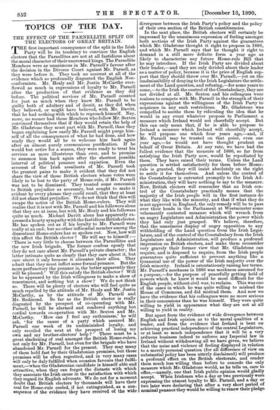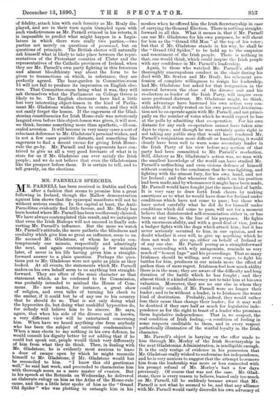TOPICS OF THE DAY.
THE EFFECT OF THE PARNELLITE SPLIT ON THE ELECTORS OF GREAT BRITAIN.
THE first important consequence of the split in the Irish Party will be its tendency to convince the English electors that the Parnellites are not at all fastidious about the moral character of their uncrowned kings. The Parnellite Members were as unanimous in Mr. Parnell's favour after the decision in the Divorce Court against Mr. Parnell, as they were before it. They took no account at all of the evidence which so profoundly disgusted the English Non- conformists. Mr. Healy and Mr. Justin McCarthy over- flowed as much in expressions of loyalty to Mr. Parnell after the production of that evidence as they did before. The political services of Mr. Parnell counted for just as much when they knew Mr. Parnell to be guilty both of adultery and of deceit, as they did when they believed, or might have believed, with Mr. Devitt, that he had nothing with which to reproach himself. Nay, more, no sooner had those Members who follow Mr. Sexton convinced themselves that if they would retain the help of Mr. Gladstone they must part with Mr. Parnell, than they began explaining how easily Mr. Parnell might purge him- self of all the consequences of what he had done, and how ready they would all be to welcome him back again after an almost purely ceremonious purification. If he would but retire for a season, they were ready to treat his services as more illustrious than ever, and to promise to summon him back again after the shortest possible interval of political penance and expiation. Even the severest of the Irish assailants of Mr. Parnell took the greatest pains to make it evident that they did not share the view of those British electors whose votes were likely to be lost to the party of Home.rule, if Mr. Parnell was not to be dismissed. They treated some concession to British prejudice as necessary, but sought to make it evident by every phrase they could recall, that they at least did not share that prejudice. We do not think that this will escape the notice of the British Home-rulers. They will realise that it is not with Mr. Parnell and his followers alone that they are at issue, but with Mr. Healy and his followers quite as much. Michael Davitt alone has apparently ex- pressed a hearty sympathy with the fastidious British elector. He has spoken out as if his loyalty to Mr. Parnell were really at an end; but no other influential member among the dissentient Home-rulers has so spoken out. Now, how will this affect the British elector ? He will say to himself:— 'There is very little to choose between the Parnellites and the new Irish brigade. The former confess openly that they do not care about Mr. Parnell's private character ; the latter intimate quite as clearly that they care about it, but care about it only because it alienates their allies. They admit that they must inflict some formal penance. But the more perfunctory the penance is, the better apparently they will be pleased.' Will this satisfy the British elector ? Will he be appeased by the Irish willingness to make a show of resentment, and nothing but a show ? We do not think so. There will be plenty of electors who will feel quite as much repelled by the attitude of Mr. Healy and Mr. Justin McCarthy, as by the attitude of Mr. Parnell and Mr. Redmond. So far as the British elector is really disgusted by the prospect of co-operating with Mr. Parnell, he will be alarmed and rendered anything but cordial towards co-operation with Mr. Sexton and Mr. McCarthy. How can I feel any enthusiasm,' he will ask, ' for the cause of a party which assured Mr. Parnell one week of its undiminished loyalty, and only recoiled the next at the prospect of losing my own and my brother-electors' help ? ' There must be a great slackening of zeal amongst the British Home-rulers, not only for Mr. Parnell, but even for the brigade who have abandoned Mr. Parnell for the present. They may many of them hold fast by their Gladstonian promises, but those promises will be often regretted, and in very many cases will only be duly fulfilled when occasion favours that fulfil- ment,—when the Gladstonian candidate is himself able and attractive, when they can forget the distaste with which they associate the Irish cause in the satisfaction with which they regard its English advocate. We do not for a moment doubt that British electors by thousands will have their zeal for Home-rule cooled, if not extinguished, as a con- sequence of the evidence they have received of the wide divergence between the Irish Party's policy and the policy' of their own section of the British constituencies.
In the next place, the British electors will certainly be impressed by the unanimous expression of feeling amongst both sections of the Irish Party against the guarantees. which Mr. Gladstone thought it right to propose in 1886„ and which Mr. Parnell says that he thought it right to demand in a still more definite form a year ago as likely to characterise any future Home-rule Bill that he may introduce. If the Irish Party are divided about their leader,—and they are only divided about their leader as a matter of policy, because it is the price of English sup- port that they should throw over Mr. Parnell,—yet on the inadmissibility of denying to the Irish Legislature the settle- ment of the Land question, and refusing,—for some years to come,—to the Irish the control of the Constabulary, they are not divided at all. Mr. Sexton and his colleagues were zealous to compete with Mr. Parnell in the strength of their- expressions against the willingness of the Irish Party to acquiesce in any such restrictions. Mr. Gladstone was- compelled to soothe them by ridiculing the idea that he would in any event whatever propose to Parliament a measure which Ireland would not cheerfully accept. But this can only mean that, if he is able to propose to Ireland a measure which Ireland will cheerfully accept,. he will propose one which four years ago,—and, if Mr. Parnell may be trusted on that point, even one year ago,—he would not have thought prudent on behalf of Great Britain. At any rate, we have had the fullest evidence that the measure of 1886, so far from satisfying the Irish Party now, would be repudiated by them. They have raised their terms. Unless the Land question is settled satisfactorily for them before Home- rule is granted, they will insist absolutely on the right to settle it for themselves. And unless the control of the Constabulary is entrusted promptly to the Irish Ad- ministration, they will have nothing to say to the measure.. Now, British electors will remember that an Irish con- trol of the Constabulary practically means that the majority of the Irish people will in the first instance do what they like with the minority, and that if what they do is not approved in England, the only remedy will be to pass over their heads in the Parliament at Westminster some vehemently contested measure which will wrench from an angry Legislature and Administration the power which they had only just grasped. We believe, therefore, that the unanimous display of angry opposition to any withholding of the Land question from the Irish Legis- lature, and of the control of the Constabulary from the Irish Legislature and Administration, will produce a profound' impression on British electors, and make them reconsider very gravely their former view that Mr. Gladstone can require, and is disposed to require, from the Irish people guarantees quite sufficient to prevent anything like a tyrannical use of the power of the Irish majority over the Irish minority. Ireland is ostentatiously raising her terms. Mr. Parnell's meekness in 1886 was meekness assumed for a purpose,—for the purpose of peacefully getting hold of powers which he knew it would be most difficult for the English people, without civil war, to reclaim. This was one of the cases in which he was quite willing to mislead the House of Commons, and did mislead them. And now we have the evidence that his colleagues were no more serious in their concessions than he was himself. They were quite willing to yield in appearance what they are not at all willing to yield in reality.
But apart from the evidence of wide divergence between English and Irish opinion as to the moral qualities of a leader, and from the evidence that Ireland is bent 01? achieving practical independence of the central Legislature,. or at least so much independence that it will be a very arduous business indeed to enforce any Imperial law in Ireland without withdrawing all we have given, we believe that the noise and violence of feeling displayed in relation to a merely personal question (for all difference of view on substantial policy has been utterly disclaimed) will produce a profound effect on the British electorate, and render them much less willing than before to concede the only measure which Mr. Gladstone would, as he tells us, care to offer,—namely, one that Irish public opinion would gladly accept. When Irishmen who a day or two previously were expressing the utmost loyalty to Mr. Parnell, and a day or two later were declaring that after a very short period of nominal penance they would be willing to renew their pledge of fidelity, attack him with such ferocity as Mr. Healy dis- played, and are in their turn again trampled upon with such vindictiveness as Mr. Parnell evinced in his retorts, it is impossible to predict what might happen in a Legis- lature in which there were really two parties,—two parties not merely on questions of personnel, but on questions of principle. The British elector will naturally ask himself what is likely to take place between the repre- sentatives of the Protestant counties of Ulster and the representatives of the Catholic provinces of Ireland, when they see Mr. Parnell's own party fighting in this ferocious and almost bloodthirsty way about the form to be given to transactions on which, in substance, they are perfectly agreed. The bear-garden in Committee-room 15 will not fail to produce its impression on English elec- tors. That Committee-room being what it was, they will ask themselves what the Parliament on College Green is likely to be. The English electorate have had a little but very interesting object-lesson in the kind of Parlia- ment Mr. Gladstone wishes them to create, and they will not easily forget the lesson. If the eagerness of the Glad- stonian constituencies for Irish Home-rule was notoriously languid even before this object-lesson was given, it will now, we think, become something more than apathetic,—ill-con- cealed aversion. It will become in very many cases a sort of reluctant deference to Mr. Gladstone's personal wishes, and in not a few cases positive distaste, and something like eagerness to find a decent excuse for giving Irish Home- rule the go-by. Mr. Parnell and his opponents have con- trived to give us all a very good foretaste of what is in store for us if Mr. Gladstone can ever satisfy the Irish people ; and we do not believe that even the Gladstonians like the prospect before them. It is certain to tell, and to tell gravely, on the elections.











































 Previous page
Previous page